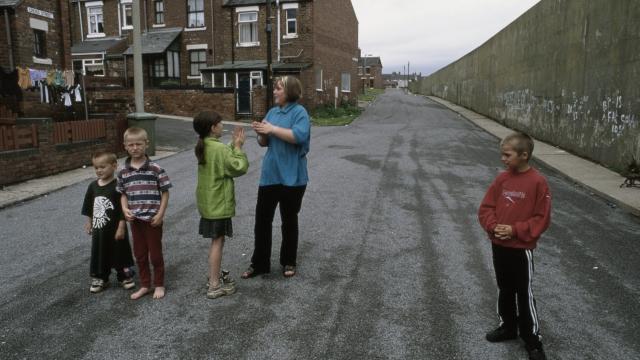
In his closely-watched first Budget speech, U.K. Chancellor Phillip Hammond held his head up high when he announced last November: “Britain is the world’s sixth largest economy.” The fifth spot, we now know, belongs to California.
Hammond's announcement came as a special blow to politicians who have advocated the position that Britain would be stronger outside the E.U. The slide in rankings is representative of a sharp deceleration in the nation’s economic growth since it voted to exit the E.U. in the June 2016 referendum.
Even more worrisome, perhaps, are the findings in a new report showing that Britain is, in no unvarnished terms, infested with poverty. Digest this fact: the UL is now home to nine of the 10 poorest regions in Northern Europe.
The report, entitled "The poorest regions in the U.K. are the poorest in Northern Europe," was compiled by Inequality Briefing, a non-political organization that aims to spread information and inform the public about current levels of inequality in Britain.
The findings centered around data produced by Eurostat, the E.U.’s data agency. Eurostat measured GDP per head in regions throughout Britain, taking into account different costs in different areas.
The report revealed that West Wales is the poorest area in Northern Europe, followed by seven other U.K. regions. Number nine on the poorest regions list is Hainaut, in Belgium, followed by the U.K.’s East Yorkshire and North Lincolnshire.
Somewhat astonishingly – though entirely understandable given the trends of inequality – inner London mapped out as the very richest region in Northern Europe, followed by Luxembourg, Brussels, Hamburg, Ile de France, Groningen in the Netherlands, Stockholm, Oberbayern in Germany, Vienna and Darmstadt in Germany.
According to Inequality Briefing, although U.K. citizens think of themselves as enjoying similar living standards as neighboring Northern European countries like France, Germany, Belgium and Holland, in reality Great Britain is much poorer. This is because much higher levels of inequality exist here than in those countries.
Figure the contrast: While nine British regions represent the 10 most economically deprived areas in northern Europe, inner London is basking in the limelight as the absolute richest place on or off the continent.
Simon Tilford, deputy director of the Centre for European Reform, pins Britain’s poverty on three principle factors: the lack of skills of a sizable portion of the workforce; weak infrastructure and a lack of affordable housing; and the centralization of nearly all political and commercial power in London to the exclusion of other regions.
Brexit Only Aggravating Poverty
The implications of Brexit are also having an affect on the wealth inequality of the nation, according to Tilford.
“Unfortunately, Brexit risks aggravating most, if not all, of these problems. And Britain’s already startling regional imbalances are likely to worsen further, leaving much of the country’s population living in areas considerably poorer than the E.U.-15 average," he said.
“The Conservatives will provide some fiscal stimulus to counter the weakening of growth caused by Brexit but will not make the long-term investments in infrastructure and skills needed by the U.K.”
Tilford’s concerns about Brexit's impacts heightening poverty and wealth disparity in Britain are supported by an official report published in January, entitled “E.U. Exit Analysis – Cross Whitehall Briefing," which was leaked to BuzzFeed
The report concludes that every region and almost every sector will be negatively hit when Britain departs the E.U. The analysis concludes that the alleged "benefits" of leaving the E.U., such as deregulation across employment law, the environment and product standards, and trade deals with other non-E.U. countries, would “struggle to mitigate the losses from leaving the customs union and the single mark.”
So defamatory was the report, in regards to the U.K.’s economic outlook once it finally departs the E.U., that a source reportedly told BuzzFeed its conclusions weren't shared publicly “because it’s embarrassing.”
Ironically, many dissatisfied and "left behind" people voted to leave the E.U. because of the already well-established wealth divisions between certain regions, centralization of power and wealth in London, and engrained poverty and lack of opportunities in their own areas. Now, those same problems are likely to get a lot worse, and the average U.K. worker even poorer.
Simon Roach is a sales assistant from Stoke on Trent, an economically deprived city in the Midlands that is hailed as Britain’s "Brexit heartland," with 69 percent of voters opting to Leave. Roach told Occupy.com: “I voted to leave the E.U. because I believed it would make our economy better off and here in Stoke, we definitely need the extra coffers.”
Now Roach is changing his tune. “I’m not impressed with the Brexit negotiations to date," he said. "Cities like Stoke seem to be getting poorer and reports that show Britain is home to nine out of 10 of the poorest regions in Northern Europe don’t hold me with confidence we’re going to be given the money we need any time soon.”
Dissatisfied with the U.K.’s economic forecast, Illona Mitchell moved to the Granada region of Spain from Chester in the North West of England in 2004 in search of a better quality of life. “The prices in the U.K. when we left were rising and every year the money we earned was buying us less and less. With the exchange rate at the time much more favorable, holidays to Spain were so cheap. When we got here, houses, house tax, car tax, fuel and food were all so much cheaper, so with more money in our pocket, our quality of life improved,” Mitchell told Occupy.com.
Now, with the cost of living rising in the U.K., leaving many in poverty and the value of the pound plummeting in the wake of Brexit, holidays to Spain and elsewhere look less tenable for many, and Mitchell said she has no regrets about her relocation to the continent.













